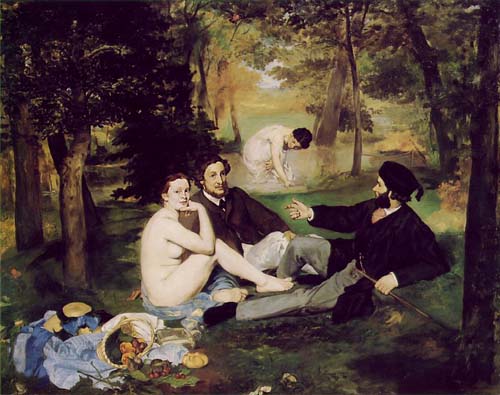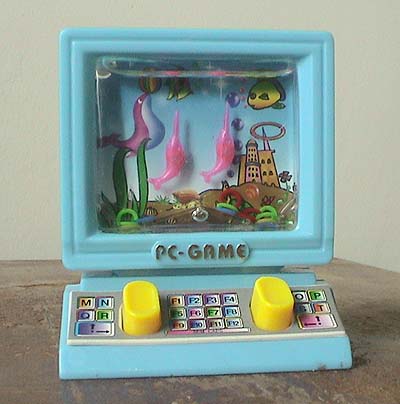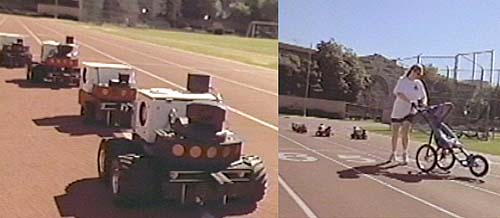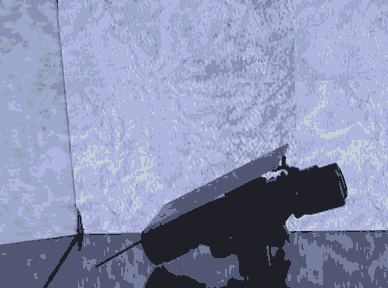
|
Lorna Mills and Sally McKay
Digital Media Tree this blog's archive OVVLvverk Lorna Mills: Artworks / Persona Volare / contact Sally McKay: GIFS / cv and contact |
View current page
...more recent posts

Leonard Shlain, in his book Art and Physics, talks about Manet's choice to muck around with perspective, obscuring the vanishing point, curving the horizon line, eliminating the middle ground, and flattening the picture plane. According to Shlain, these innovations contributed to a message from the artworld, "warnings to the public that the Western paradigms [ie: Euclid] about space, time and light were about to change." Shlain's connections between art and science are a bit thin, based pretty much solely on chronology. But it is interesting to see these parallel histories on the same page. Besides, this chapter was an excuse to indulge in the somewhat guilty pleasure of looking/thinking again at paintings by Manet.

Édourard Manet, "Le Déjeuner sur l'herbe, " (1863)
(NB: bigger version moved to comments - scroll down)

Just saw a new phrase for being '"a bit thick" that I like very much (thanks Jim):
not the sharpest tool in the shed
will make a change from my old standard:
not the brightest light on the tree
And then of course there's always:
not the shiniest marble in the bag
not the ...... ...... in the ......
anyone?
KissMachine • • • KissMachine • • • KissMachine• • • KissMachine• • • KissMachine
I have posted about Kiss Machine in the past. This little magazine is on the move. For instance, the new Babies and Robots issue has a spine! Perfect binding?! Criminey! But even more exciting are these personal highlights:
- Emily Pohl Weary surpasses herself in the ever-eloquent editorial. Excerpt: "Perhaps the only remaining refuge from high speed is birth and the awkwardness of life during our first few years. Before we gain fine motor control and an awareness of how to use things like keyboards, we're stuck in an altogether human reality."
- Jesse Hirsh spins a reality-based cyborg tale, culminating with an unsettling metaphor of the internet as the body for an unfortunately homogeneous new mind. Excerpt: "The evolution or transcendence of the human mind toward divinity is not a new or isolated concept. However, the field of artificial intelligence is perhaps the most meticulous, ambitious and widespread attempt at this goal that we have seen for some time. It is rivalled only by the religiosity of NASA and the space program."
- Tyler Clark Burke writes a ripping good mortality rant. Excerpt: "All the strangers are alive on the planet right now (which is cool, I mean rad, without being radical); everyone who is alive will be dead at the same time at one time, and then almost mid-sentence like right now I reminisce about all the best run-on sentences I've ever written, like someone is reading it and it is alive and so are they and, punctuation long-forgotten, I remember that we are social beings and we do share things like fantasies about the Unabomber and Henry Darger-dirges ..."
- I'm very grateful for the lucky accident that plopped me into the world during this particular junction of space/time because once in a while I get to read Paul Hong's writing. I have tried several times both in the past and this very evening to find a representative passage of Paul's work, but the writing is so tight and resonant that to pull one bit out is to do the whole a serious disservice. Just find the zine and read it.

The words below are from Dr. Maja Materic, computer scientist studying artificial intelligence, and Director of the Robotics Laboratories at the University of Southern California, quoted from the overly-styled millenial documentary Me and Isaac Newton by Michael Apten. Above images are stills from the film, depicting Materic, her child, and some of her robots.
There's always this worry on the part of some people that robots will take over the world. But robots will always be completely different from people because they've evolved in a completely different context. There's really no comparison. [...] We'll just have to make sure, as they become more complex, that we understand them well enough. The same way we have to understand any creatures. Nothing else is controllable today, not just robotics. Animals aren't controllable and yet we are not always threatened by their presence.
